 |
The Saint of the Day
St. John Baptist Vianney, August 9
Prof. Plinio Corrêa de Oliveira
Biographical selection:
Today is the feast day of the Curé of Ars, confessor, intercessor for the Clergy’s sanctification and model for those entrusted with the care of souls. He lived in the 19th century (1786-1859).
Comments of Prof. Plinio:
There is always a word to say about St. John Baptist Vianney because he was one of the greatest saints of the 19th century. His life presents so many different facets that one always can take new lessons from it.
In the first decades of the 19th century, he was a poor seminarian. Not only was he poor but he had little intelligence, remarkably little. He had to make an extraordinary effort to follow his studies at the seminary, and twice failed the examinations required before ordination. His intellectual insufficiency gave much cause for concern about his priestly vocation. Finally, at age 30 he barely managed to complete the course and was ordained.
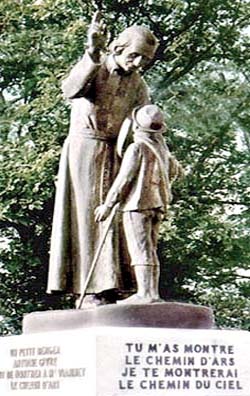
The site where he entered Ars. He told the boy: "You have showed me the way to Ars. I will show you the way to Heaven"
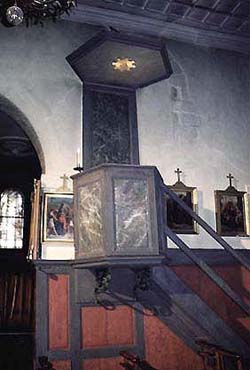
The pulpit in the Church of Ars where the Cure delivered his famous sermons
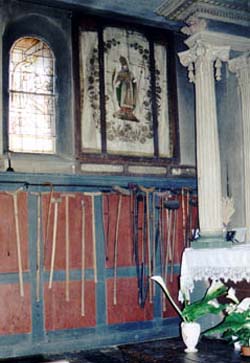
The Chapel of St. Philomena, to whom the Saint gave all the credit for the miracles he worked
|
The Bishop sent this dull priest to a tiny village in the south of France, the village of Ars. There he began his sacerdotal life, which would permeate all of Europe with its light and, from there, spread throughout the world. He was canonized a saint by Pius XI in 1925 and proclaimed patron of parish priests.
What was it that distinguished this Saint? Even though he didn't have any natural qualities to make him an exceptional priest, he became a magnificent priest, an extraordinary apostle, a confessor with rare discernment, and a preacher who exercised a profound influence over souls.
What was the reason for such efficiency? St. Therese of Lisieux used to say, "For love, nothing is impossible." What this means is that one who truly loves God, Our Lord and Our Lady will obtain the means to do what Divine Providence calls him to do. This applies perfectly to St. John Vianney. For example, let us look at his preaching. He became an extraordinary preacher. He prepared his sermons the best he could, then he studied them. They were not sermons touching on the highest topics of theology; they were common catechetical instructions for the people. But when he taught, he spoke with such conviction, with such a great love of God, with words so blessed that the graces of those sermons were communicative and touched all who heard them.
A defect I still didn't mention: he had a weak voice, and in those happy times when microphones didn't exist, the multitudes that gathered to listen his preaching “ filling the church of Ars and its environs “ often could not hear him. Even though persons at a distance could only hear a few loose phrases of his sermons, many of them still converted. Others could not hear him at all, but they also converted, only from the effect of seeing him.
In his Soul of the Apostolate, Dom Chautard relates this telling fact. An impious lawyer went to Ars to mock its unlearned Curé. But he returned converted. Someone asked him: What did you see there? He answered: "I saw God in a man." That is, the presence of God was in St. John Vianney. One could note that God was with him and in him. I consider the witness of this impious lawyer about the Curé of Ars “ "I saw God in a man" “ one of the most glorious homages a man can receive.
The blessings from his sermons and charisma of his words extended far and wide, and all over Europe pilgrimages started to be made to Ars. This was one of the reasons for the countless conversions St. John Vianney made.
He was also a martyr of the confessionary. He used to spend hours and hours there hearing confessions and giving counsels. We don't realize the tremendous penance it represents to spend long hours hearing the foul moral things people do. In the confessionary he applied the advice of St. Alphonse of Ligouri to not hurry through the confession, to be patient, to consider each penitent as if he were the only person to be heard and to help him conquer each one of his sins. So he entered battle against each sin, insisted on the practice of virtue, advised good behavior, and often he denied absolution. Yes, if he could not note a serious intent of amendment, he denied absolution to that person.
He was an enemy of dancing. You should note that the dances of that time were far different from the immoral and outrageous dances of today. The young ladies were completely covered and had skirts that reached to the floor. If he condemned those dances, what would he say about ours? His condemnation went so far as to deny absolution to those who would not promise to stop going to such dances. Many persons would go to other churches to receive absolution. Hearing this, he simply commented: If other priests want to send them to Hell, it is up to them.
This extraordinary Saint spent all his time in the church: at the pulpit, confessionary or altar. At night when he returned to his house, one might think he would at least get a deserved rest. But no, a new fight started, this time against the devil. For decades he fought a nightly battle with the devil “whom he called Grapin“ in which the devil physically assaulted him and tormented him with deafening noises and insulting words. On the night before a person particularly dominated by the devil would come to confess to St. John Vianney, the devil would inflict stronger torments on the Saint. Once he set fire to the Curé's bed. In response St. John Vianney used to increase his special penances, flagellations, and prayers to win the graces for his words to effect the needed conversions.
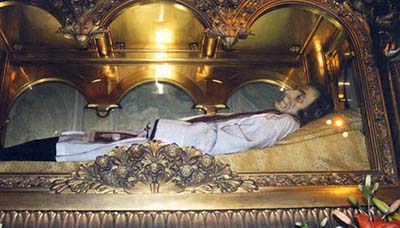
Shrine of St. John Vianney in the Basilica of Ars
|
It is beautiful to consider that Divine Providence, in order to further increase his apostolate, gave him the gift of the miracles. In fact he worked many miracles. But he did not attribute them to himself. In his church he built a shrine to St. Philomena, a virgin martyr that Paul VI removed from the list of the saints. St. John Vianney did not think the same way, and attributed all his miracles to her.
I will mention just one extraordinary fact that reveals his gift of reading souls “ the discernment of spirits “ that he had. This fact was reported by one of his penitents, a young lady who was a Daughter of Mary. She went to confession to the Curé of Ars. After she knelt, he began to tell her events from her past life.
- Do you remember that you went to a ball on such-and-such occasion?
- Yes, I remember.
- Do you remember that at a certain moment a handsome young man entered the ballroom. He was quite elegant, appeared very upright and danced with several young ladies?
- Yes, I do.
- Do you recall that you had a great desire to dance with him?
- I recall that.
- Do you recollect that you became sad because he didn't ask you to dance?
- Yes, I do.
- Do you remember that by chance you looked down at his feet and saw a strange blue light coming from them?
- Yes. I remember.
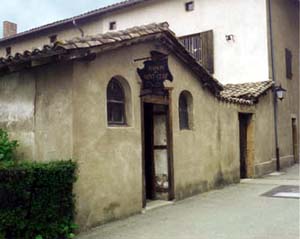
The house of the Cure of Ars
Photos from Ars Pilgrimage website
|
Until now, everything he described to the young lady came from his gift of discernment, because naturally he knew nothing of her past. Then, he made the astonishing revelation:
- That young man was none other than the devil who had taken that shape to tempt several of the young women there. He was unable to approach you because you are a Daughter of Mary protected by her, and you were wearing the Miraculous Medal.
The fact is rich in lessons. It also explains the extraordinary fame that spread because of episodes like this “ for he used to read the souls of many such penitents who came to him for confession “ throughout the environs of the small village of Ars, then all of France, Europe and the whole world.
There would be many other extraordinary facts that could be told about his life, but I leave them for another opportunity.
In these sad and decadent post-Vatican II times in which we live, let us pray to St. John Baptist Vianney and ask him to heal the Catholic clergy of whom he is the patron. And let us ask him to give us the necessary discernment and strength of will to be free of any liberalism in customs.


  | | Prof. Plinio Corrêa de Oliveira | |
The Saint of the Day features highlights from the lives of saints based on comments made by the late Prof. Plinio Corrêa de Oliveira. Following the example of St. John Bosco who used to make similar talks for the boys of his College, each evening it was Prof. Plinio’s custom to make a short commentary on the lives of the next day’s saint in a meeting for youth in order to encourage them in the practice of virtue and love for the Catholic Church. TIA thought that its readers could profit from these valuable commentaries.
The texts of both the biographical data and the comments come from personal notes taken by Atila S. Guimarães from 1964 to 1995. Given the fact that the source is a personal notebook, it is possible that at times the biographic notes transcribed here will not rigorously follow the original text read by Prof. Plinio. The commentaries have also been adapted and translated for TIA’s site.
|
Saint of the Day | Home | Books | CDs | Search | Contact Us | Donate

© 2002- Tradition in Action, Inc. All Rights Reserved
|
 |

|